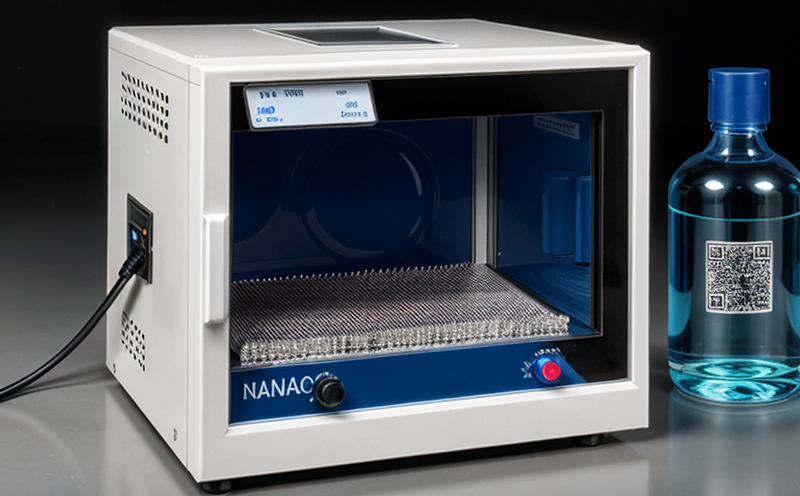ISO 21361 Characterization Testing of Engineered Nanomaterials
The ISO 21361 standard provides a comprehensive framework for the characterization and testing of engineered nanomaterials (ENMs). This service ensures that manufacturers, researchers, and regulatory bodies can accurately assess the properties and potential risks associated with ENMs. The process involves multiple steps to fully understand the physical, chemical, and toxicological characteristics of these materials.
Engineered nanomaterials are defined as intentionally manufactured substances having at least one external dimension less than 100 nm, which can exhibit unique properties due to their size and shape. These materials have found extensive use in various sectors including electronics, biomedicine, and environmental remediation. However, the small size of ENMs means that they can easily enter biological systems, posing potential health and environmental risks.
The ISO 21361 standard aims to address these concerns by providing detailed protocols for the physical, chemical, and toxicological characterization of ENMs. This service plays a crucial role in ensuring the safety and efficacy of products containing nanomaterials throughout their lifecycle from development through manufacturing to disposal.
The testing process begins with thorough sample preparation which involves dispersing the nanomaterial into a suitable medium for analysis. Following this, several analytical techniques are employed depending on the specific properties being evaluated. These include electron microscopy (TEM/SEM), dynamic light scattering (DLS), zeta potential measurement, and toxicity assays.
Electron microscopy provides high-resolution images of the nanomaterials allowing detailed characterization regarding shape, size distribution, and aggregation state. Dynamic light scattering is used to determine the hydrodynamic diameter of colloidal nanoparticles while zeta potential measurements help assess surface charge which influences dispersion stability and biocompatibility.
Toxicological evaluations are essential for understanding how ENMs interact with biological systems. In vitro tests may involve exposing cells or tissues to the nanomaterials under controlled conditions followed by assessment of cellular viability, oxidative stress levels, inflammation markers etc. For in vivo studies, animals are exposed to the material and monitored for signs of toxicity over time.
Once all data has been collected it is analyzed according to ISO 21361 guidelines to generate a comprehensive report outlining key findings related to physical properties, chemical composition, surface characteristics as well as any potential health effects. This information can then be used by stakeholders involved in product development or regulatory compliance processes.
Our team of experienced professionals utilizes state-of-the-art equipment and follows strict quality control procedures throughout each step of the testing process ensuring accurate and reliable results every time. By leveraging this expertise you gain peace of mind knowing that your products meet stringent international standards while minimizing risks associated with improper handling or use.
Eurolab Advantages
At Eurolab, we pride ourselves on delivering high-quality services tailored specifically to our clients' needs. Our ISO 21361 characterization testing of engineered nanomaterials offers several advantages over other service providers:
- Expertise and Experience: Our team consists of highly qualified scientists with extensive experience in nanotechnology research and development.
- State-of-the-Art Facilities: Equipped with advanced instrumentation such as scanning electron microscope (SEM), transmission electron microscope (TEM), atomic force microscope (AFM) among others, ensuring precise measurements.
- Comprehensive Reporting: We provide detailed reports that go beyond basic results to offer valuable insights into the nature and behavior of nanomaterials.
- Rapid Turnaround Time: Efficient workflows allow us to deliver timely reports without compromising on accuracy.
- Compliance with Standards: All our tests follow international standards like ISO 21361 ensuring consistency and reliability of results.
Customer Impact and Satisfaction
By choosing Eurolab for your ISO 21361 characterization testing needs, you are investing in the safety and efficacy of your products. Our comprehensive testing helps ensure compliance with relevant regulations which is critical not only for avoiding penalties but also for maintaining consumer trust.
For quality managers, this service provides valuable data that can inform decisions about product improvements or process modifications aimed at enhancing performance without compromising safety.
Compliance officers benefit from having robust evidence supporting their claims regarding adherence to regulatory requirements. This can simplify the audit process and reduce potential risks associated with non-compliance issues.
R&D engineers gain valuable insights into how ENMs behave under different conditions which could lead to innovations in product design or formulation strategies.
Procurement departments appreciate knowing that suppliers meet rigorous standards when sourcing raw materials containing nanomaterials. This ensures consistency across batches and reduces supply chain disruptions due to quality issues.
Positive experiences from past clients have shown significant improvements in operational efficiency, reduced development cycles, and enhanced reputation among peers and stakeholders alike.
Environmental and Sustainability Contributions
Engaged in sustainable practices is an integral part of our corporate culture here at Eurolab. By providing accurate characterization testing according to ISO 21361, we contribute positively towards environmental protection.
The detailed understanding provided by this service enables better management of nanomaterials throughout their lifecycle from production through disposal. Proper handling can prevent unintended releases into the environment which might otherwise lead to pollution or contamination incidents.
In addition, compliance with stringent standards helps reduce the likelihood of accidents involving hazardous substances thus protecting both human health and ecosystems alike.
Our commitment extends beyond just testing; we also offer consulting services on best practices for managing nanomaterials safely. By doing so, we aim to foster a culture of responsibility within industries dealing with these unique materials.





